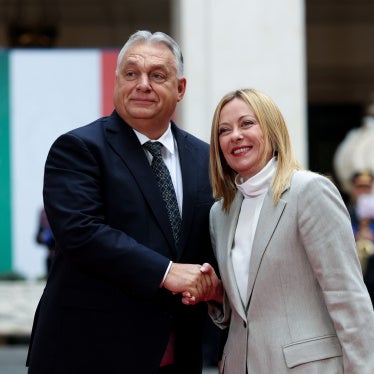Human Rights Watch expressed its disappointment at today's decision of the International Court of Justice (ICJ) that a Belgian arrest warrant for the acting Foreign Minister of the Democratic Republic of the Congo violated international law. The group stressed, however, that the ruling left intact the Belgian law’s sweeping “universal jurisdiction” provisions which allow Belgian courts to prosecute atrocities committed abroad.
The ICJ ruled that the Belgian warrant failed to respect the Foreign Minister's "immunity from criminal jurisdiction." The Court noted, however, that even sitting government ministers may not "enjoy impunity in respect of any crimes they might have committed" and could be prosecuted in an international court or once they left office.
"This decision effectively shields some state officials from prosecution for atrocities," said Reed Brody, Advocacy Director of Human Rights Watch. "Government ministers who commit serious crimes are not likely to be prosecuted at home, and this ruling means they will enjoy impunity abroad as well, at least while they are in office. This decision goes against the international trend towards accountability for the worst abuses, but it should not stop Belgium from pursuing cases against perpetrators no longer covered by immunity."
The group said that the case of Hissène Habré illustrates the importance that the Belgian law can play in assuring that perpetrators of the worst international crimes are brought to justice. In February 2000, a court in Senegal, where Habré lives in exile, indicted the former Chadian dictator on charges of torture and crimes humanity, and placed him under house arrest. It was the first time that an African had been charged with atrocities by the court of another African country. In March 2001, however, Senegal's Supreme Court ruled that he could not be tried in Senegal for crimes allegedly committed in Chad because Senegal had not adopted the necessary procedural laws. However a group of Habré' s victims, including several Belgian citizens, are now seeking Habré's extradition to stand trial in Belgium, and the President of Senegal, Abdoulaye Wade, has recently agreed, after a plea by United Nations Secretary General Kofi Annan, to hold Habré in Senegal pending an extradition request from Belgium. That case is now before Investigating Judge Daniel Fransen of the Brussels district court, who will soon visit Chad to investigate Hissène Habré´s crimes.
Brody added that today's decison "highlights the need for the rapid establishment of the International Criminal Court, which will be able to investigate and prosecute those individuals -- including state leaders -- accused of crimes against humanity, genocide, and war crimes when national courts are unwilling or unable to do so, and which expressly rejects any substantive or jurisdictional immunities."







